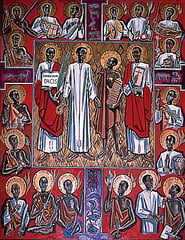Scripture: Lectionary 353. Monday, June 3. Tobit 1:1-2.2:19. Psalm 112:3-4,5-6. Mark 12: 1-12
“Why do bad things happen to good people?” Rabbi Kushner entitled his book with this question. It could be placed on the cover of the little book or more correctly on the scroll of Tobit. The question is profound and belongs to the study of Theodicy. This philosophical treatment of evil in the world persists despite the belief that God is all knowing, merciful, and just. The question puzzled biblical authors like the one who wrote Job and the one who composed the fourteen chapters of Tobit. We enter into this book in our first reading in the liturgy of the word for the next six days. We will see how the author pursues the question of why bad things happen to good people.
Tobit like Job is a very righteous person. We may even say he is scrupulous about the way he combats the problem of the poor, the unburied, and the demonic. The author is an excellent story teller and creates for us many insights into the way a righteous Israelite confronts the world of his time in an alien land. The problems he faces are quite real and pull us into the exciting and sometimes humorous events in the life of these real to life characters named Tobit, Anna, Tobias, and Akhir. Our author is skilled in putting his wisdom into many literary forms that we have become familiar with through the liturgy and our own personal reading of the Bible. The book has been written in Greek probably by a Jew in Diaspora (living outside of the Land Israel). Fragments of it have been found at the Dead Sea Scroll discovery that are in Aramaic and Hebrew. The book is set during the time of the Exile but has been written around the third or fourth century before the Common Era.
Tobit will face many of life’s difficulties and burdens even in the closeness of his relationship with his wife Anna! He remains faithful to God despite an accident or the working of a demon that causes the dropping of a sparrow to blind him for four years. He is a model for doing good to and for others, especially, what we Catholics would call the “corporal works of mercy.” Do you remember them from the old catechism?
Tobit lives in a foreign land and therefore must be very prudent in how he lives out doing these good things especially for his own family and friends. The author continues his theodicy throughout the fourteen chapters as he weaves the many scenes that show both the sufferings of Tobit and some of the graces he enjoys. Despite it being a work of historical fiction it is considered by us and the Orthodox an inspired work. We list it among the deuterocanonical works similarly as we do for other writings done in Greek by Diaspora Israelites.
We all pose the question that Rabbi Kushner does and we struggle as how to give ourselves and others a good answer. The mystery of God’s presence and plan for all of humankind is hidden and obscure as we try to reason about good and evil in our world. The biblical books of Tobit and Job help us to see that we are not alone in asking the hard questions of God. In fact, the Word of God in the both the Hebrew and Christian scriptures poses the same questions we have in our minds and hearts. The perseverance of Job and Tobit in living with their hard questions while still being faithful to the practices of religion and its values is the most hopeful way of dealing with our own odyssey, journey, and theodicy. Amen.
Copyright 2013 Fr. Bertrand Buby, S.M.
About the Author

Guest
We welcome guest contributors who graciously volunteer their writing for our readers. Please support our guest writers by visiting their sites, purchasing their work, and leaving comments to thank them for sharing their gifts here on CatholicMom.com. To inquire about serving as a guest contributor, contact editor@CatholicMom.com.



.png?width=1806&height=731&name=CatholicMom_hcfm_logo1_pos_871c_2728c%20(002).png)
Comments